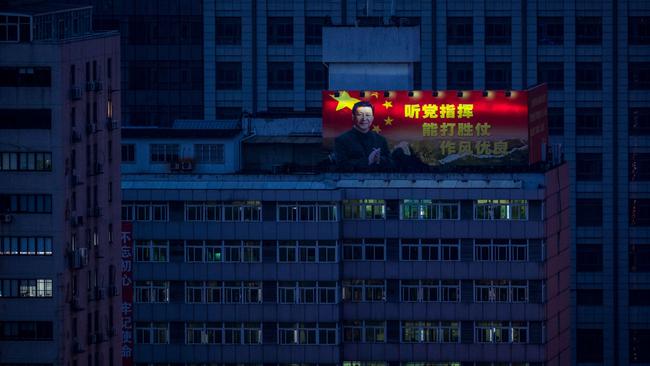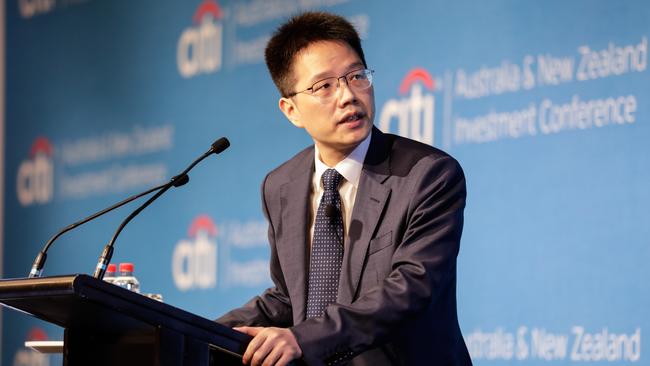
The event, during which Xi Jinping is expected to have his role as leader of the world’s second largest economy extended indefinitely, has overshadowed decision making in China for most of 2022.
China’s slowing growth – exacerbated by harsh lockdowns in the name a zero Covid-19 policy and nervousness about the property sector – had been one of the factors continuing to dampen world economic growth.
Concern over the outlook for the Chinese economy was addressed in the latest IMF economic forecasts released this week and is an important factor shaping the Reserve Bank’s thinking and its decision to only raise the cash rate by 25 basis points instead of 50bp last week.
The Budget, which will come after the weekend congress, can also be expected to discuss Canberra’s view of China’s prospects.
With information out of China tightly controlled, all public events next week – including the appointment of new figures to the Chinese leadership and a major speech by Xi – will be closely scrutinised for what they portend.
Will Xi continue with his crack down on the private sector including high-flying companies like Jack Ma’s Alibaba? What sectors of the economy might he favour? How long will restrictions on people flows in and out continue?
How will his ideas of “dual circulation” – mainly more self reliance – and “common prosperity” – a more equal distribution of income – play out in a practical way?
While some had expected that Xi might open China up after the congress, expectations now are that won’t happen until after the Two Sessions meeting in March.
China’s growth rate has been downgraded this year as the strict lockdowns continued longer than anyone expected – and at a time when the rest of the world was learning to live with the virus.
Some are already predicting its growth rate this year will come in below three per cent – a big slump from a robust 8.1 per cent last year.
Citi’s chief China economist, Xiangrong Yu, in Sydney this week for the Citi investment conference, is one of the more optimistic economists on China.
He is expecting China’s growth to come in at 3.3 per cent this year, rebounding to 5.6 per cent next year. Living closer to the action, Yu may well have more insights into the machinations at the top of China than the IMF economists sitting in Washington.
While those continually predicting the collapse of the Chinese economy are inevitably wrong and often politically motivated, there are many who see continued lockdowns, ageing population, the diversification away from products made in China and Xi’s coolness to the private sector as permanent negative factors acting on the economy whose outlook was so robust a few years ago.
Beijing’s perceived support for Vladimir Putin is also playing into wariness about dealing with China – including Joe Biden’s actions preventing US chip makers selling into the Chinese market.
Yu believes there will be a “substantial easing” in Covid-19 related controls after the Two Sessions next March. He says signs that this will happen could be another vaccination campaign ahead of any opening up and more public comments to its population about how to manage Covid-19.

“Real business should start from next year,” he tells The Australian in an interview.
Yu believes that the problems in the housing sector are – if not quite coming to an end – starting to find a floor. “We think housing is approaching the low end of an L shaped curve and will stabilise at a low level,” he says.
This means that housing will no longer be the drag on the economy next year as it was this year.
Yu argues that the Chinese industrial system has shown remarkable resilience in the face of the lockdowns with officials learning how to manage them better – in ways which minimise their impact on production.
As Yu points out, Chinese exports have enjoyed a bumper year as consumers have spent up on Chinese made Covid-19 tests, new computers and other goods.
While Australia tends to focus its discussion on trade with China on the state of our exports, Australians are also strong buyers of goods from China.
Figures released this month show that Australia imported a record $10.6bn in goods from China in August – more than from Japan, the UK and US combined – the most imported from any country in a single month.
Yu sees the continued strong demand for goods made in China as underwriting its economic outlook for next year, pointing out that despite the pandemic, China’s share of world trade increased.
He says the issue in China is not the supply side which he praises for its resilience, but on the domestic and global demand side.
Yu is watching who will replace China’s premier Li Keqiang – the last Chinese leader to visit Australia – next week and the wording of Xi’s speech for more policy signals.
China’s economy has proved remarkably resilient, as Yu says, in the face of some major headwinds, and its policy makers have many more levers than their peers in the West. But the real question is whether China is about to re engage with the world or whether Xi’s strong grip on the country will continue to hamper its growth.
Australian policy makers are taking a more gloomy view than Yu. The congress will provide the first new tea leaves to study to determine if things will really change in China for the better – or not.






As Jim Chalmers steps up talk of a possible recession, all eyes are on Beijing for the Communist Party national congress next weekend